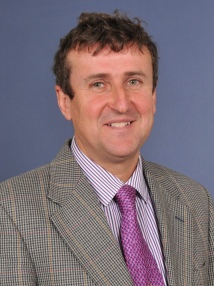Summary
Stephen R. Smith is Professor of Bioresource Systems in the Department of Civil and Environmental Engineering at Imperial College London. Professor Smith has 25 years of experience investigating the treatment and agronomic properties of sludges and organic wastes recycled to land and their environmental impact, including nutrients, potentially toxic elements, organic contaminants and pathogens.
He graduated from the University of Reading with a BSc in Horticulture in 1983 and received his PhD, also at Reading, on the horticultural and agricultural reuse of biosolids products. He joined WRc (Water Research Centre) in 1989 as a senior soil scientist responsible for research programmes on the agricultural recycling of sewage sludge and moved to Imperial College in 1997 as a lecturer in Environmental Engineering. He has a broad base of experience investigating the agronomic value of organic wastes and was the Principal Investigator (PI) of a major programme of work funded by EPSRC and in collaboration with the Environment Agency and Water Industry on agricultural utilisation of biosolids products.
He was a specialist adviser to Defra on the agronomic value of biosolids in the recent revision of the UK Fertiliser Recommendations (RB209). Other related work for Defra has quantified the agronomic benefit of industrial and treated biowastes. Recent research, supported by EPSRC, the Water Industry and Defra has examined the survival and significance of enteric pathogens in sludge-treated agricultural soil.
He was co-investigator on a programme of research for the Food Standards Agency on the environmental impact of nonylphenol in sludge-treated agricultural soil. Professor Smith was also a member of the Expert Group on Risk Assessment of Sewage Sludge of the European Branch of the International Life Sciences Institute (ILSI) which reviewed the European risk assessment of the surfactant linear alkylbenzene sulphonate for agricultural use of sewage sludge. Professor Smith has worked overseas on the problems of sewage sludge disposal and recycling on farmland in warm climates, notably in Egypt where he was a consultant to WRc on the Cairo Sludge Disposal Study funded by the European Investment Bank and sponsored by the Cairo Wastewater Organisation. He is Senior Technical Adviser to a Smart Water Fund project in collaboration with the Department of Biotechnology and Environmental Biology, Royal Melbourne Institute of Technology (RMIT) on a project evaluating the pathogen risk and nutrient status of air-dried and stored biosolids in Victoria, Australia.
He was PI of a study on home composting putrescible household waste in the UK, recently chairing a national meeting on the subject. Other projects, based in Cyprus, are developing biodrying technologies to produce auxiliary fuels from biodegradable municipal and other wastes for use in industry, and the anaerobic digestion of industrial biowastes, in collaboration with the University of Cyprus. He has acted as an expert witness for the Environment Agency and local authorities in the UK concerning hazardous and biodegradable waste management practices on land.
Professor Smith has written over 230 scientific papers, reports and publications for Government and Industry on recycling biosolids in agriculture including a standard reference text book on the subject published by CABI International. He is author and coauthor of a number of major scientific reviews for UK Government and the European Commission on contaminant behaviour and impacts on the environment. This has included recent reports on the sources and significance of organic contaminant inputs to soil for Defra, heavy metal bioavailability in compost for WRAP and the implications of recycling sewage sludge in agriculture on human health and the environment for Water UK. He has given invited contributions and key note lectures at major international meetings on biosolids including, for example, the Sustainable Land Application Conference, 4 - 8 Jan 2004, Orlando, Florida; the Australian Water Association (AWA) Biosolids Specialty III Conference, 7-8 June 2006, Melbourne, the Water Corporation of Western Australia and Curtin University symposium on Research Perspective of the Land Application of Biosolids, 28 September 2006, Perth, the European Water Association Workshop on Knowledge and Practices of Using Treated Sewage Sludge on Land, 15-16 April 2008, University of Cambridge and the AWA Biosolids Specialty Conference IV, 11-12 June 2008, Adelaide. Professor Smith organised a major meeting in the UK recently on behalf of the Sustainable Organic Resources Partnership (SORP) on Bioresources to Land: Managing Nutrients to Complete the Cycle at the Royal Academy of Engineering, London.
Professor Smith is a member of the Wastewater Management Panel of the Chartered Institution of Water and Environmental Management (CIWEM), the Chartered Institution of Wastes Management (CIWM), the Expert Advisory Group of SORP, and he is registered as a Chartered Environmentalist (CEnv).
Selected Publications
Books
Smith, S.R., 1996, Agricultural Recycling of Sewage Sludge and the Environment, Wallingford, CAB International

